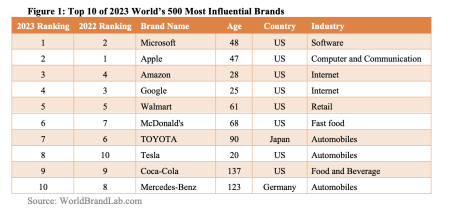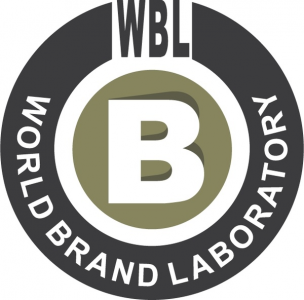World Brand Lab Unveils '2023 World's 500 Most Influential Brands'

NEW YORK, December 13, 2023 (Newswire.com) - The 20th edition of the 2023 World's 500 Most Influential Brands, compiled by World Brand Lab, was released in New York on Dec. 13. Microsoft claimed the top spot, surpassing last year's leader Apple, which now holds second place. Amazon secured third place. The United States dominated with 193 brands in the top 500, while France, China, Japan, and the United Kingdom followed as major contributors. Notably, the list showcases the ascent of Chinese brands, with 48 making the cut, surpassing Japan for the first time and securing third place globally. Standout brands on the list include State Grid, Tencent, Haier, Huawei, China Resources, China Life, Wuliangye, China Southern Power Grid, TSINGTAO, Sinochem, Hengli, XCMG, Shenghong, and ITG Holding.
The evaluation of brands for the World's 500 Most Influential Brands is based on global influence, measured by a brand's ability to develop markets and generate profits. Following three key indicators of brand influence, namely market share, brand loyalty and global leadership, World Brand Lab tracked more than 8,000 leading brands around the globe to pioneer the World's 500 Most Influential Brands list. When measuring brand loyalty, iTrust Rating's data were consulted. SuperFinance's ESG database was referred to when measuring brand leadership, especially ESG performance.
Dr. Steve Woolgar, Chairman of the World Brand Lab academic committee, notes the 20th-year milestone of the analysis report, covering 32 countries in 2023. U.S. companies maintain a dominant position, with 193 in the top 500, solidifying their global brand leadership. France, China, Japan, and the United Kingdom form the second tier, while Germany, Switzerland, and Italy constitute the third tier. Economic challenges in Europe notwithstanding, European super brands remain robust, though geopolitical conflicts and energy crises pose challenges.
An empirical study by World Brand Lab and SuperFinance reveals the pressures faced by multinational brands amid globalization. The study suggests a need for brand expansion strategies to pivot towards diverse localization and prioritize Environmental, Social, and Governance (ESG) performance. The 2023 list spans 47 industries, with food and beverage leading, followed by the automobile industry. The aging global population presents opportunities for growth in pharmaceutical and health brands.
There are 25 new brands on this year's list. The highest-ranking new brand is the CIGNA GROUP from the U.S., securing the 85th position overall. CIGNA has established a vast global medical network, offering 24-hour online medical care. Notable brands like SpaceX (U.S.), ENEL (Italy), and ASML (Netherlands) also feature. Six new Chinese brands, including POLY, TikTok, China Huadian, TONGWEI, CNAF, and Bosideng, made the list. Brands like Credit Suisse (Switzerland) and MGM (U.S.) dropped off due to serious crises, scandals, and negative societal impacts. Others, like Priceline (U.S.) and Skype (U.S.), were excluded for poor performance and underwhelming development.
The listed brands have an average age of 98.57 years, a slight increase from last year's 98.22 years. Notably, 225 brands, constituting over 40% of the list, have reached the venerable age of 100 years or more. The oldest brand, Saint-Gobain from France, is 358 years old, followed closely by Aviva and Moutai, both with histories exceeding 300 years. Among the 48 Chinese brands, Moutai, TSINGTAO, Wuliangye, Bank of China, and AIA have surpassed the century mark. In the food and beverage sector, 30 out of 35 brands have exceeded 100 years.
Dr. John Deighton, Emeritus Professor at Harvard Business School, attending the World Executive Summit and the World's 500 Most Influential Brands release event in Hong Kong on Dec. 19, suggests that brands should use creators and influencers for branding, avoiding direct engagement with global conflicts. He cites examples dating back to 2008, like Coca-Cola on Facebook and Ford's use of creators for the Fiesta launch. Given China's lead in creator marketing over America, this branding approach is likely appealing to Asian marketers. Dr. Jean Claude Larreche, Emeritus Professor at INSEAD, notes the increasingly VUCA (volatile, uncertain, complex, and ambiguous) world, emphasizing two strategic priorities: corporate value growth, not just revenue, and corporate value capture, not just customer value creation.
Dr. Haisen Ding, CEO of the World Executive Group and the World Brand Lab, underscores the need for future CEOs to master uncertainty. For CMOs or CBOs, leveraging AI is crucial for continuous global brand footprint monitoring. Dr. Sara Kim, Professor of Marketing at Hong Kong University, emphasizes the importance of localization for globalized brands, including a dedicated crisis management team for geopolitical risks, adherence to local regulations, unique product lines based on local preferences, and a focus on ESG standards. Dr. Jing Xu, Professor of Marketing at Peking University, asserts that a brand's purpose must remain clear despite the real world's complexity. Genuine sustainable development, as seen in many exemplary and growing brands, involves incorporating goals that benefit humanity and the world into their mission.
The World Brand Lab's year-end report indicates that over the past decade, global brand strategies faced escalating pressures with declining consumer trust. Economic, political, social, and technological factors hindered globalization, leading to an era of diverse localization. Companies are adapting organizational structures to integrate brands with local communities, industries, cultures, and customs. Since 2003, World Brand Lab has tracked over 80,000 major brands in 60 countries. Initially chaired by Nobel laureate in Economics, Professor Robert Mundell, this premier brand consulting firm is now wholly owned by the World Executive Group.
Source: World Brand Lab
